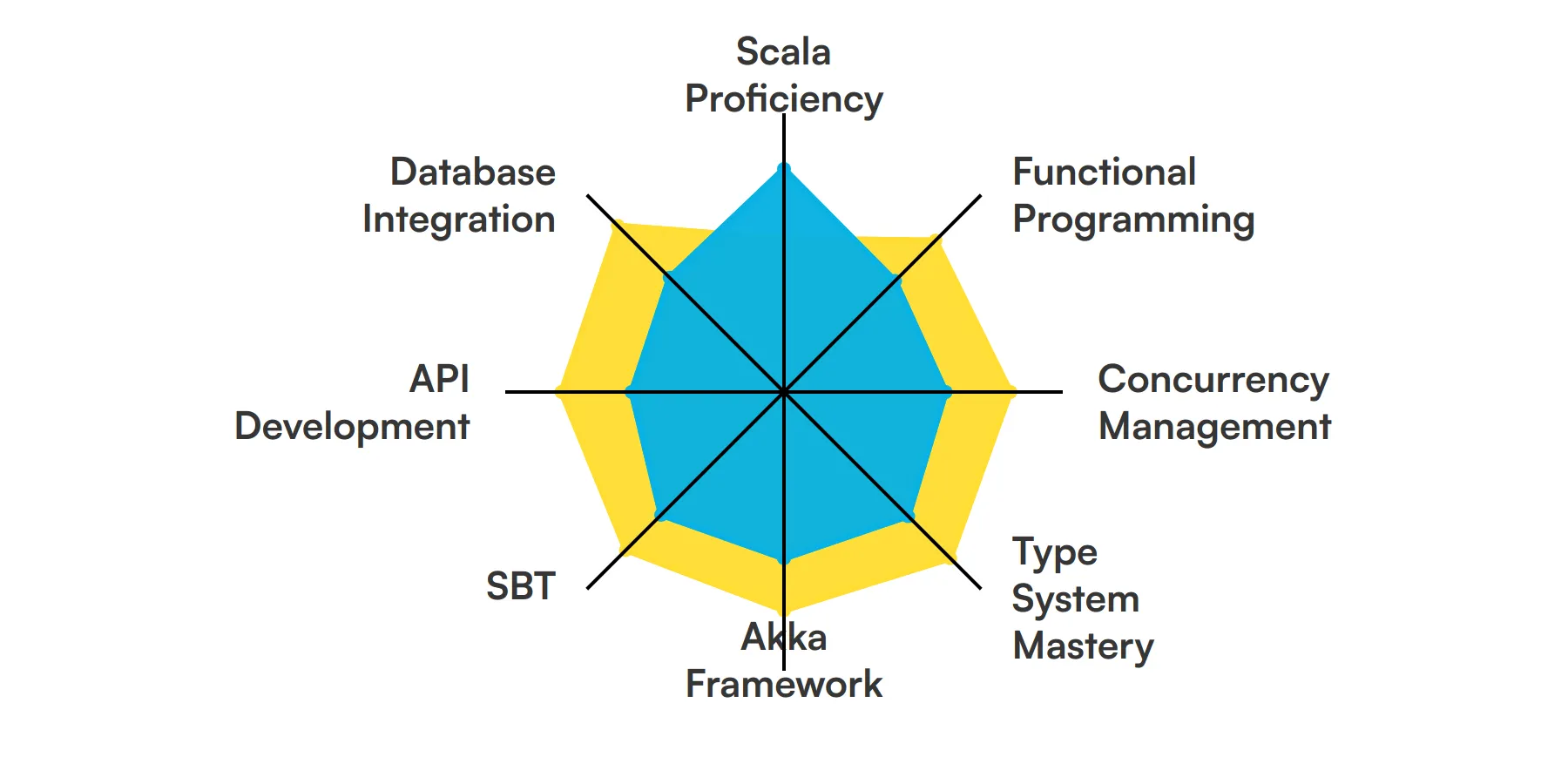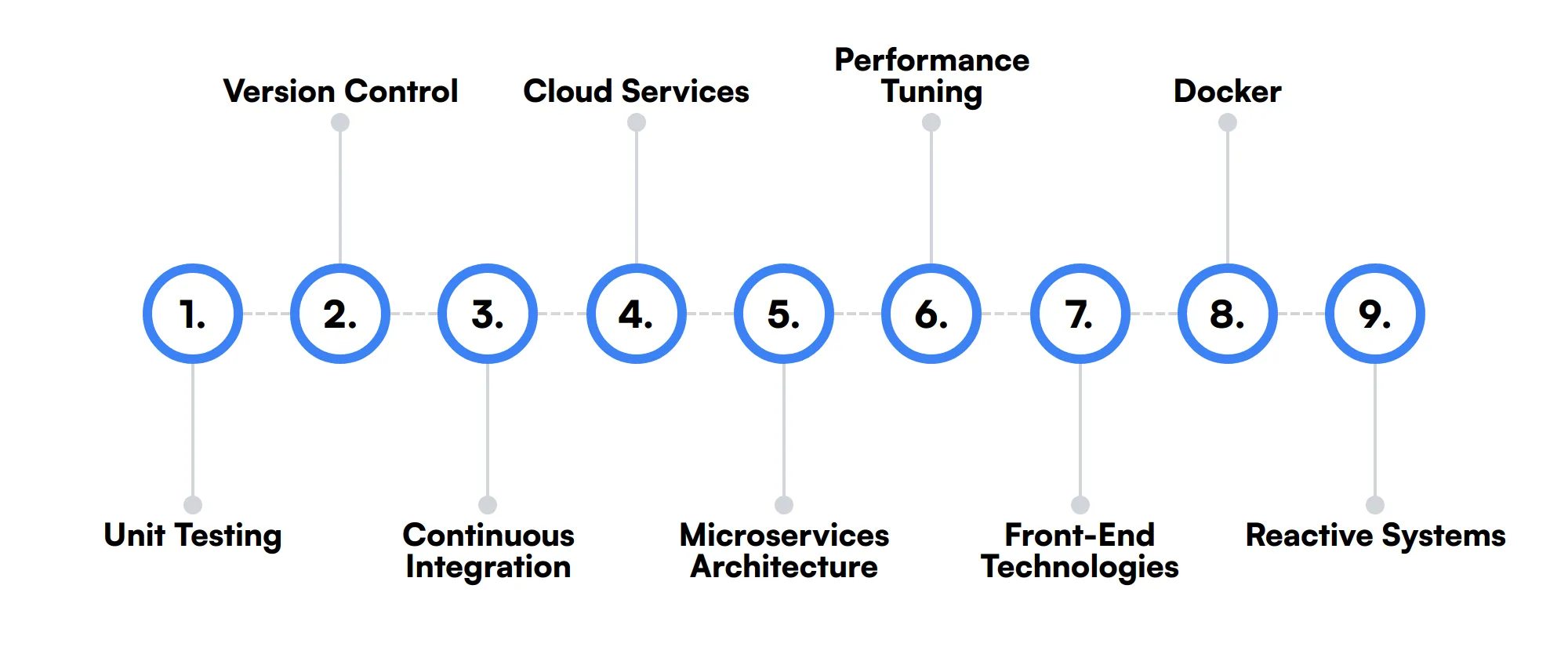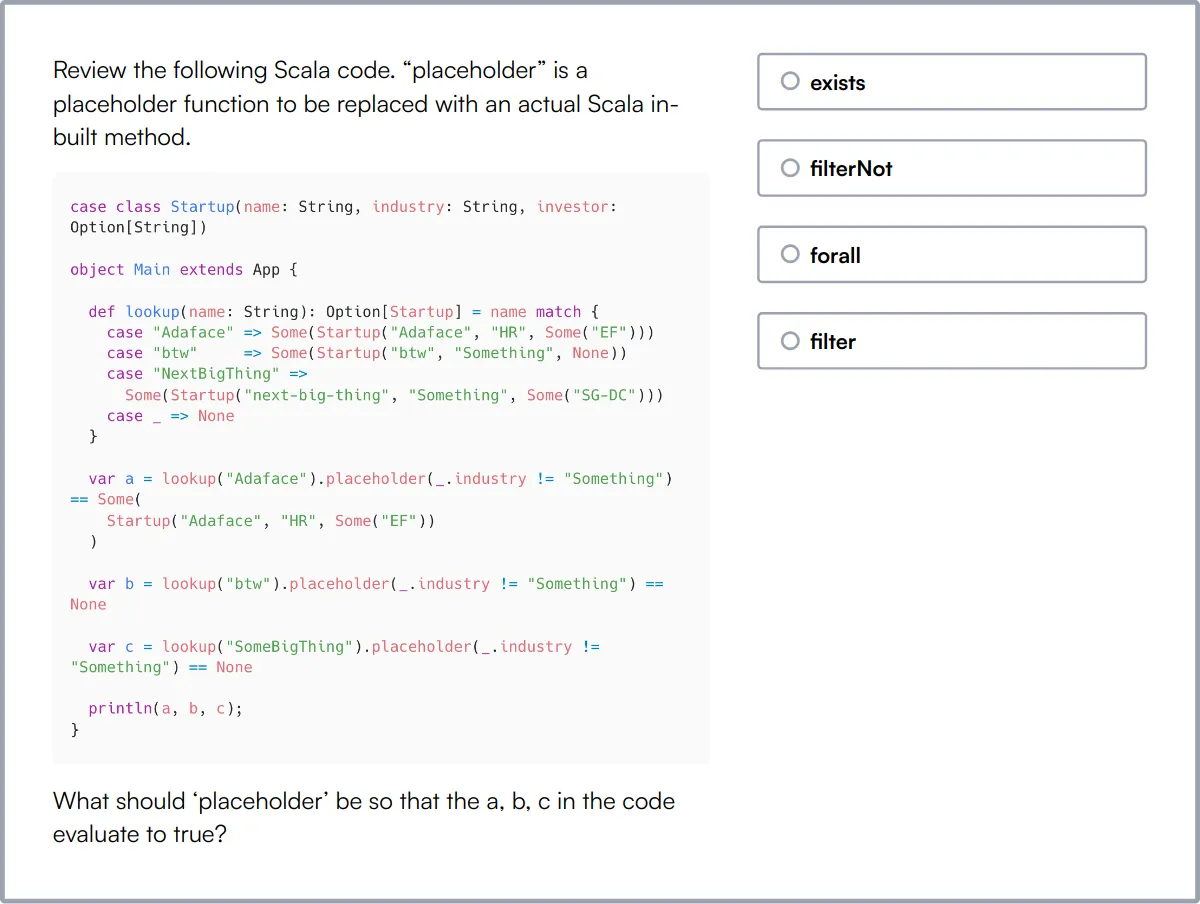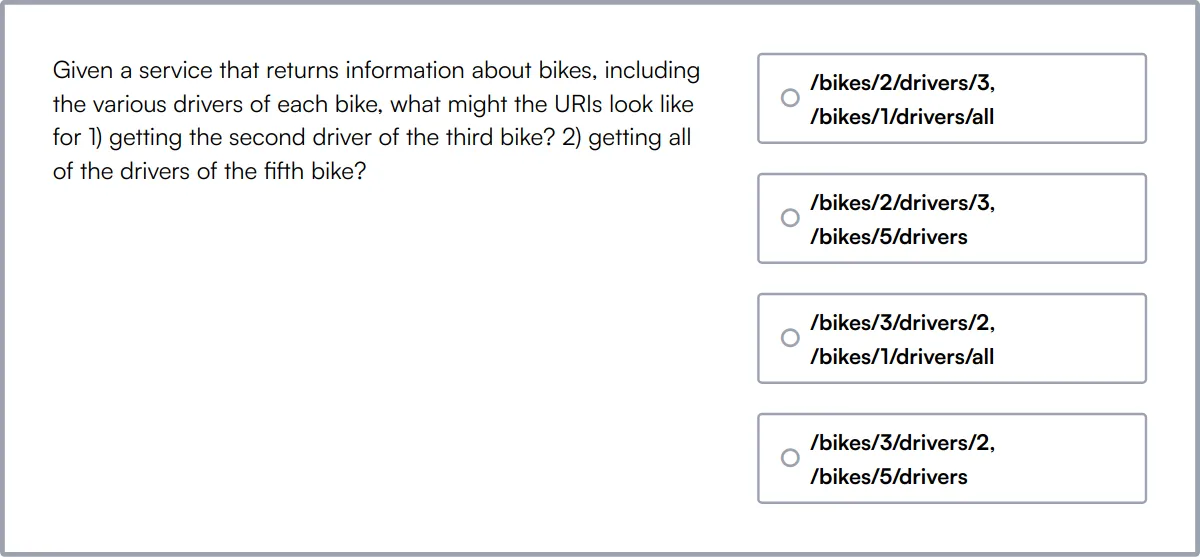Scala developers play a critical role in building robust and scalable applications. They leverage the power of the Scala programming language to create solutions that are both functional and efficient, often working on backend systems, data processing, and distributed computing.
Skills required for a Scala developer include a strong understanding of the Scala language and its ecosystem, proficiency in functional programming, and familiarity with tools like Akka and Play Framework. Additionally, problem-solving abilities and effective communication are key to success in this role.
Candidates can write these abilities in their resumes, but you can’t verify them without on-the-job Scala Developer skill tests.
In this post, we will explore 8 essential Scala Developer skills, 9 secondary skills and how to assess them so you can make informed hiring decisions.
Table of contents
8 fundamental Scala Developer skills and traits
The best skills for Scala Developers include Scala Proficiency, Functional Programming, Concurrency Management, Type System Mastery, Akka Framework, SBT & Build Tools, API Development and Database Integration.
Let’s dive into the details by examining the 8 essential skills of a Scala Developer.

Scala Proficiency
A Scala developer must have a deep understanding of Scala language fundamentals, including its functional programming capabilities and object-oriented features. This knowledge is crucial for writing clean, efficient, and scalable code.
For more insights, check out our guide to writing a Scala Developer Job Description.
Functional Programming
Understanding functional programming principles is key for a Scala developer, as Scala integrates these concepts extensively. This skill helps in creating solutions that are less prone to bugs and easier to reason about.
Concurrency Management
Scala developers often deal with applications that require handling multiple processes at once. Proficiency in managing concurrency and understanding threading is important to ensure application performance and reliability.
Check out our guide for a comprehensive list of interview questions.
Type System Mastery
A strong grasp of Scala's type system allows developers to use types effectively to write safer and more reliable code. This includes leveraging advanced features like generics and variance.
Akka Framework
Experience with the Akka framework is often essential for building reactive applications in Scala. This includes understanding of actors, stream processing, and building distributed systems with Scala.
SBT & Build Tools
Scala developers need to be proficient with Scala's build tools, primarily sbt (Scala Build Tool), to manage project dependencies, builds, and deployments effectively.
API Development
Developing and managing APIs is a common responsibility for Scala developers, requiring skills in creating robust, secure, and scalable APIs that interact with various web clients and services.
Database Integration
Integrating and managing databases is essential for Scala developers, as most applications require some form of data storage and retrieval. Knowledge of SQL and NoSQL databases is particularly valuable.
9 secondary Scala Developer skills and traits
The best skills for Scala Developers include Unit Testing, Version Control, Continuous Integration, Cloud Services, Microservices Architecture, Performance Tuning, Front-End Technologies, Docker & Kubernetes and Reactive Systems.
Let’s dive into the details by examining the 9 secondary skills of a Scala Developer.

Unit Testing
Writing and maintaining unit tests is important to ensure the functionality and quality of code. Scala developers use testing frameworks like ScalaTest or Specs2 to automate testing processes.
Version Control
Proficiency in version control systems, such as Git, is necessary for Scala developers to manage changes to the project codebase, collaborate with others, and maintain a history of modifications.
Continuous Integration
Experience with continuous integration tools like Jenkins or GitHub Actions helps Scala developers automate the testing and deployment of Scala applications, enhancing productivity and reducing errors.
Cloud Services
Knowledge of cloud platforms such as AWS, Azure, or GCP can be beneficial for deploying and managing Scala applications in a scalable and distributed environment.
Microservices Architecture
Understanding how to design and implement microservices architectures is useful for Scala developers involved in building complex, scalable systems that require high availability and resilience.
Performance Tuning
Scala developers should be able to analyze and improve the performance of applications, which involves profiling tools and techniques to optimize both code and system architecture.
Front-End Technologies
While not always mandatory, familiarity with front-end technologies like JavaScript, HTML, and CSS can be advantageous for Scala developers working on full-stack development projects.
Docker & Kubernetes
Skills in containerization and orchestration technologies such as Docker and Kubernetes are increasingly important for deploying and managing Scala applications in a consistent and scalable manner.
Reactive Systems
Understanding the principles of reactive systems can enhance a Scala developer's ability to build systems that are more resilient to failures and capable of handling varying loads efficiently.
How to assess Scala Developer skills and traits
Assessing the skills and traits of a Scala developer involves more than just reviewing their resume. While a resume can highlight their experience and education, it doesn't provide a clear picture of their proficiency in key areas such as Scala proficiency, functional programming, concurrency management, and more.
Skills-based assessments are a reliable way to evaluate a candidate's true capabilities. By focusing on practical tasks and real-world scenarios, you can better understand their expertise in the Scala ecosystem, including their mastery of the type system, familiarity with the Akka framework, and experience with SBT and build tools.
To streamline this process, consider using Adaface assessments. These tests can help you achieve a 2x improved quality of hires and an 85% reduction in screening time. With tailored assessments, you can ensure that your candidates have the necessary skills in API development, database integration, and other critical areas.
Let’s look at how to assess Scala Developer skills with these 3 talent assessments.
Scala Online Test
Our Scala Online Test evaluates a candidate's proficiency in the Scala programming language, covering both functional and object-oriented programming paradigms. The test includes a variety of topics such as collections, pattern matching, and concurrency, making it comprehensive for assessing a developer's ability to handle complex application development in Scala.
The test assesses candidates on their understanding of Scala's core concepts like type inference, traits, mixins, higher-order functions, and immutable data structures. It also includes a coding question to gauge hands-on programming skills and the ability to apply Scala test frameworks effectively.
Successful candidates demonstrate a strong grasp of Scala's functional programming features and the ability to develop scalable and maintainable code. The test also evaluates proficiency in error handling and the use of parallelism in application development.

REST API Test
Our REST API Test measures a candidate's understanding and skills in designing and interacting with RESTful APIs. It covers fundamental aspects such as API design, best practices, and backend service architecture, ensuring a thorough evaluation of the candidate's technical aptitude in API integration.
This test challenges candidates with scenarios on REST API basics, including HTTP methods, status codes, authentication processes, and serialization formats. It aims to assess their practical abilities in creating and testing APIs, along with their knowledge of coding principles related to API development.
Candidates who perform well on this test are typically proficient in developing and managing APIs that are secure, scalable, and efficient. They demonstrate a strong understanding of network communication and the ability to design APIs that effectively serve client applications.

SQL Online Test
Our SQL Online Test is designed to evaluate a candidate's skills in SQL database management and query formulation. It covers a wide range of SQL functionalities including database creation, table operations, and advanced querying with joins and subqueries.
The test examines a candidate's ability to perform CRUD operations, utilize conditional expressions, and manage views, indexes, and transactions. It also assesses their knowledge in applying mathematical and string functions to manipulate data and ensure database performance and security.
High-scoring candidates are adept at designing efficient database schemas and writing optimized SQL queries that enhance data retrieval and manipulation. They also understand the importance of locks and transactions in maintaining data integrity and performance.

Summary: The 8 key Scala Developer skills and how to test for them
| Scala Developer skill | How to assess them |
|---|---|
| 1. Scala Proficiency | Evaluate the developer's ability to write and optimize Scala code. |
| 2. Functional Programming | Assess understanding and application of functional programming principles in Scala. |
| 3. Concurrency Management | Check the developer's skills in handling concurrent processes effectively. |
| 4. Type System Mastery | Review the developer's expertise in utilizing Scala's type system. |
| 5. Akka Framework | Test knowledge and practical application of the Akka toolkit. |
| 6. SBT & Build Tools | Examine proficiency in using SBT and other Scala build tools. |
| 7. API Development | Assess ability to design, develop, and integrate APIs. |
| 8. Database Integration | Evaluate skills in integrating and managing database systems. |
Scala Online Test
Scala Developer skills FAQs
What are the key skills required for a Scala Developer?
A Scala Developer should be proficient in Scala, understand functional programming and concurrency management, have mastery over the type system, and be familiar with the Akka framework. Skills in SBT, API development, and database integration are also important.
How can recruiters assess a candidate's proficiency in Scala?
Recruiters can assess Scala proficiency through technical interviews, coding tests, and by reviewing past projects. Asking candidates to solve real-world problems using Scala during the interview process can also provide insight into their practical skills.
What is the importance of functional programming in Scala development?
Functional programming in Scala helps in building scalable and maintainable code. It allows developers to write code that is less prone to bugs and easier to test, making it a key skill for Scala developers.
Why is understanding the type system critical for Scala developers?
The type system in Scala provides mechanisms to write safe and reliable code. Mastery of the type system allows developers to utilize advanced features of Scala, such as generics and variance, effectively enhancing code quality and maintainability.
What tools should Scala developers be familiar with for effective build management?
Scala developers should be proficient in using SBT (Simple Build Tool) for project builds. Familiarity with other build tools like Maven or Gradle is also beneficial. These tools help in managing project dependencies and automating the build process.
How do microservices architecture and cloud services enhance Scala applications?
Microservices architecture allows Scala applications to be scalable and resilient. Integrating cloud services facilitates deployment, scaling, and management of these applications, enabling more efficient handling of resources and better performance.
What role does Docker and Kubernetes play in Scala application development?
Docker and Kubernetes are critical for deploying and managing Scala applications in containers, providing scalability, fault tolerance, and efficient resource utilization. They help in creating consistent environments for development, testing, and production.
How can unit testing and continuous integration benefit Scala development projects?
Unit testing ensures that individual components of Scala applications function correctly, while continuous integration helps in automating the testing and build processes, leading to quicker detection of errors and more reliable software releases.

40 min skill tests.
No trick questions.
Accurate shortlisting.
We make it easy for you to find the best candidates in your pipeline with a 40 min skills test.
Try for freeRelated posts
Free resources



